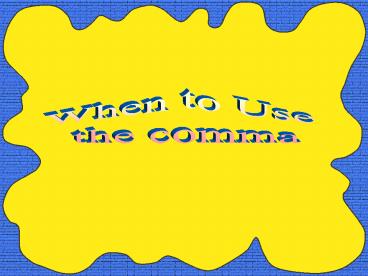When to Use - PowerPoint PPT Presentation
1 / 10
Title: When to Use
1
When to Use the comma
2
The Serial Comma
Use a comma to set off the elements of a series
(three or more things), including the last two.
You do not need to use the comma between the last
two. Be careful they dont appear attached to
each other.
My favorite foods are pizza, ice cream, and
french fries.
3
Coordinating Conjunction
Use a comma and a coordinating conjunction (and,
but, or, nor, for, yet, so) to separate two
independent clauses.
Mom appears a nervous wreck about her daughters
wedding, but her daughter is calm and rational.
If the two independent clauses are brief and
nicely balanced, this comma may be omitted, but
if in doubt the comma is always correct.
The steak is good, but could be cooked more.
4
Introductions
Use a comma to set off introductory elements.
Afraid of the storm, the children began to cry.
In the spring of 1993, the Johnsons moved to
Idaho.
5
Coordinate Adjectives
Use a comma to separate adjectives.
I couldnt bring myself to dive into the murky,
dirty, weedy water.
Rule of thumb Add a comma between adjectives if
it would sound correct to add an and or but.
economical and efficient economical, efficient
But not a little and old house. A little old
house would be correct.
6
Proofreading Activity
Where does the comma belong?
I couldnt bring myself to dive into the murky
dirty weedy water.
Afraid dinner the children went to bed.
In the summer of 1996 I went to basketball camp.
7
Contrast
Use a comma to set off elements that express a
contrast or a turn in the sentence.
The car was beautiful, but not economical enough
for their budget.
They were looking for something economical, not
luxurious.
8
Dates, States, Titles
Use a comma to set off states and countries,
years (in a full date), titles, etc.
I was born in Atlanta, Georgia.
Bob Johnson, Clarkia Elementary Principal,
proposed a new recess schedule at the staff
meeting.
9
Quoted Language
Use a comma to set off quotes.
This movie is scary, said Joey.
10
Parenthical Elements
Use a comma when an appositive phrase can be
removed from a sentence without changing its
meaning or making it ambiguous
My grandfather, a respected and loved member of
the community, passed away.
Use a comma when an absolute phrase is treated as
a parenthetical element
Absolutely, you are right.
An addressed person(s) is always parenthetical
I am telling you, my fellow colleagues, we must
stand together.
An interjection is treated as a parenthetical
element
Excuse me, but there is, most certainly, more
here than meets the eye.































